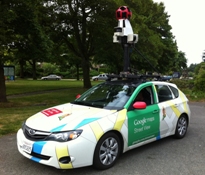The Supreme Court Considers Google Street View
 All of the interest in the Supreme Court tomorrow is likely to be focused on Hobby Lobby and, to a lesser extent, Harris v. Quinn. But I’ll be watching something that happens before either of those decisions is announced. I’ll be looking to see if the Supreme Court granted cert in the StreetView case. I hope the answer is no.
All of the interest in the Supreme Court tomorrow is likely to be focused on Hobby Lobby and, to a lesser extent, Harris v. Quinn. But I’ll be watching something that happens before either of those decisions is announced. I’ll be looking to see if the Supreme Court granted cert in the StreetView case. I hope the answer is no.
The StreetView case — Google v. Joffe — is one that I’ve blogged extensively about over the past year. See Part I, Part II; see also my coverage of the Ninth Circuit opinion, Google’s petition for rehearing, and the filing of Google’s cert. petition.) Briefly, Google’s StreetView cars intercepted the contents of transmissions from residential wi-fi routers whose owners had not turned on encryption. A number of class actions have been filed claiming that the interceptions were violations of the federal Wiretap Act. Google moved to dismiss them, arguing that radio communications (like wi-fi) basically have to be encrypted to be protected by the Wiretap Act. The district court and the Ninth Circuit disagreed, holding that the exception Google points to applies only to traditional AM/FM radio broadcasts.
Although I disagree with the Ninth Circuit’s reasoning and would find it professionally advantageous if the Supreme Court decided to take the case, I hope it denies cert. Here’s why. Read More »The Supreme Court Considers Google Street View
 The Aereo case was argued this morning, and before Paul Clement could even get rolling on his introduction on behalf of the broadcaster plaintiffs, Justice Sotomayor hit him with this:
The Aereo case was argued this morning, and before Paul Clement could even get rolling on his introduction on behalf of the broadcaster plaintiffs, Justice Sotomayor hit him with this: [Madisonian readers: I wrote this for a general audience. I’m reposting here for your amusement/fact-checking.]
[Madisonian readers: I wrote this for a general audience. I’m reposting here for your amusement/fact-checking.]